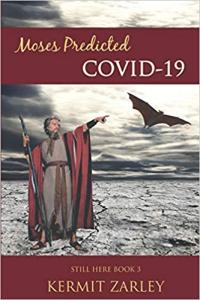(To fully understand this post, see the previous post, “COVID-19: Part 9: Jesus Did Not Abolish the Mosaic Food Laws.”)
There is one other New Testament text scholars cite to support their interpretation that Jesus abolished the Mosaic food laws in Mk 7.19b. It is a vision that the Apostle Peter had and is recorded in Acts 10-11. We learn that God was preparing a meeting between Peter and the Roman centurion named Cornelius for this Gentile and his Gentile household to hear the gospel–the good news about Jesus of Nazareth.
Luke records the vision in his book Acts by saying of Peter, “He saw the heaven opened and something like a large sheet coming down, being lowered to the ground by its four corners. In it were all kinds of four-footed creatures and reptiles and birds of the air. Then he heard a voice saying, ‘Get up, Peter; kill and eat.’ But Peter said, ‘By no means, Lord; for I have never eaten anything that is profane or unclean'” (Acts 10.11-14). The voice repeated this two more times. Then the sheet with animals on it ascended to heaven.
As Peter puzzled about the meaning of this vision, three men came to him, being sent by Cornelius. So, they obviously were Gentiles as well. I believe the three times the voice spoke the same message to Peter corresponds to these Gentile men being three in number. The meaning is all three men are not unclean simply because they are Gentiles. For, Jews were well known for regarding Gentiles metaphorically like the unclean animals designated by Moses.
These three men explained to Peter that their master Cornelius, who lived in Caesarea near the Mediterranean Sea, had a vision telling him to send men to Joppa–which was thirty miles south and also near the sea–to look for a man named Peter who was staying at a house beside the sea that was owned by a leather tanner named Simon. That is where Peter was, and he was one they were looking for. So, Peter went with them.
When Peter arrived with these three men at Cornelius’ house, Peter related his vision to them and explained its meaning. He said, “I truly understand that God shows no partiality, but in every nation anyone who fears him and does what is right is acceptable to him” (Acts 10.34-35).
Peter then preached the good news about Jesus to them. While Peter was still preaching, “the Holy Spirit fell upon all who heard the word, . . . for they heard them speaking in tongues and extolling God” (Acts 10.44-45). That is what had happened to the 120 Jewish disciples on the Day of Pentecost, fifty days after Jesus’ resurrection (Acts 2). So, Peter water “baptized them in the name of Jesus” (v. 48).
During Peter’s vision, the voice had told him, “What God has made clean, you must not call profane” (Acts 10.15). Did this mean the Mosaic food laws had been abolished for faithful Jews like Peter? That is, unclean animals were now deemed clean. That is what most Christians have been taught as I was in the early 1960s by my church pastor. He had graduated with honors from Dallas Theological Seminary. Twenty years later, this school produced the two-volume The Bible Knowledge Commentary: An Exposition of the Scriptures by Dallas Seminary Faculty. Concerning Acts 10.15, which says, “What God has made clean, you must not call profane,” this commentary says, “This rebuttal gives Mark 7:14-23 more meaning (cf. 1 Tim 4:4). . . . In retrospect Peter must have recognized that Jesus as the Messiah cleansed all goods [sic–foods?] from ceremonial defilement.”
On the contrary, I think God only used the unclean animals in Peter’s vision to signify metaphorically that Gentiles are not unclean. Thus, Jesus’ Jewish disciples like Peter can now have interaction with Gentiles, including table fellowship (cf. Galatians 2.11-14), Jews did not eat with Gentiles), and preach the gospel to them. All scholars agree with this. But I am saying that is the only meaning to take from this vision. Thus, it is not supposed to also be taken literally in the sense that it means God has now changed concerning food laws in Leviticus 11 and Deuteronomy 14, that they are now abolished. If it does also mean that, it would be a big deal that would illicit conversation among the Jewish disciples when Peter returned to Jerusalem to tell his fellow apostles about this (Acts 11.1-18). But that never came up in their discussion about Peter’s experience.
In conclusion, neither Jesus’ remark about eating with unwashed hands nor Peter’s vision abolished the Mosaic food laws for Jews that are set forth in Leviticus 11 and Deuteronomy 14. Therefore, I suspect that Gentiles the world over should at least be informed about these food laws, as if they may indicate some hygienic value, and thereby avoid contact with pathogen-laden bats that may have caused COVID-19.
(See the next post, “COVID-19: Part 11: Paul Did Not Abolish Mosaic Food Laws.”)
[See my new book at amazon.com, , published June 1, 2020.]














